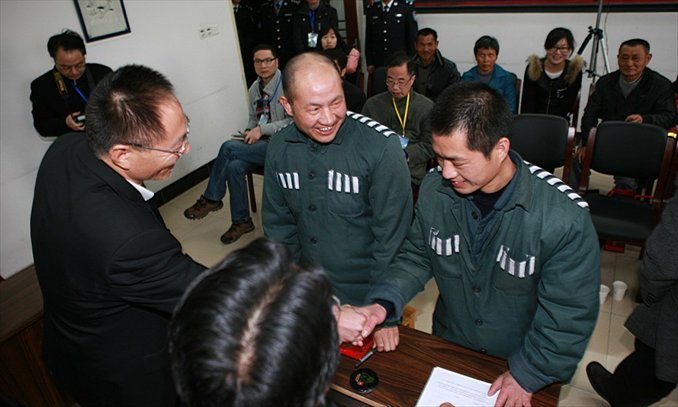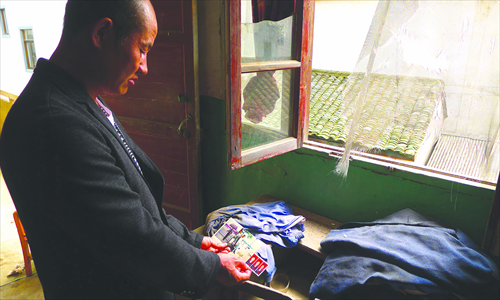Efficient injustice

Last Tuesday, when 49-year-old Zhang Gaoping and 38-year-old Zhang Hui heard the judge announce they were acquitted after serving 10 years in jail for a wrongful charge of rape and murder after forced confession, they couldn't believe their ordeal was finally over.
An officer of the Zhejiang People's High Court unlocked Zhang Gaoping's handcuffs in the court and apologized to him in person. Zhang then said to the judge, "Today you are a judge, but your descendants may not be judges. If there is no guarantee of unified institutions and law, they could be wrongfully accused as we were and teeter on the brink of the death penalty. Please remember that."
No escape from nightmare
When Zhang and his nephew walked out of court and were surrounded by their relatives, they said they cherished freedom like never before. But still, the memory of a decade-long nightmare can never be taken away.
During the night of May 18, 2003, truck driver Zhang Gaoping and his nephew Zhang Hui were transporting freight to Shanghai as usual. But their lives would be transformed when they agreed to let a fellow villager hitch a ride.
"It was during the SARS outbreak, few people were going outside. I gave her a ride out of kindness and we had no reason to refuse her as we knew her and lived in the same village," Zhang told the Global Times.
Zhang Gaoping said they dropped off the 17-year-old girl named Wang Dong in downtown Hangzhou at about 1:30 am and then continued on their way to Shanghai. Wang told Zhang Gaoping she would take a taxi from there to meet her brother-in-law. However, her naked body was found in a drainage ditch in the western suburbs of Hangzhou the next morning.
The two men became the principal suspects for Zhejiang police as they were the last people to have been seen with Wang alive. However, police couldn't find any physical evidence to charge Zhang and his nephew with the crime.
Instead, even though a police DNA identification result showed that DNA under the victim's fingernails belonged to neither man, they chose to ignore it.
The police also failed to check the video camera at the highway toll gate which showed Zhang's truck leaving the area, thus ruling him out from being at the crime scene.
"They interrogated me for seven days continuously, they gave me no rest and I only had half a boxed lunch to eat in seven days. They didn't even give me a seat but forced me to stand.
At last I was too exhausted to stand anymore. They stubbed out burning cigarettes on my nose and kept splashing me with water to keep me awake," Zhang said.
But Zhang and his nephew never admitted their guilt, even under severe torture. The police then came up with another solution. They sent the men back to the detention house where other detainees beat and forced them to sign statements of confession that had already been written up under police orders.
On February 2004, Zhang Hui and Zhang Gaoping were respectively sentenced to death and life in jail by the Hangzhou Intermediate People's Court. After an appeal, the court changed the original sentences to a death sentence with reprieve and 15 years in jail.
Zhang and his nephew were later sent to the Xinjiang Uyghur Autonomous Region to serve their sentence. In 2005, Zhang saw a criminal case reported on TV. It involved a naked girl being found dead in the suburbs of Hangzhou with a taxi driver named Gou Haifeng being caught and confessing to the murder.
Few people would have made a link between the two cases, but Zhang certainly did. "The modus operandi and the location were so close to Wang Dong's case. And I thought it was very likely that Gou was the true murderer of Wang," Zhang said.
Zhang reported this to prison authorities immediately and asked them to review the case. A check by Hangzhou police in 2011 found a shocking discovery. The DNA traces found under Wang Dong's fingernails matched Gou's.
Gou had already been executed in 2005 for the second murder but his guilt was evident and the court quashed the sentence last Tuesday, freeing Zhang and his nephew.
A lost decade
When Zhang and his nephew returned home in Huangshan Mountain in Anhui Province last Wednesday, the entire village turned out and set off firecrackers to welcome them home. "We knew these two men and we never believed they would commit murder," a local villager told the Global Times.
However, the warm greeting could not make up for the huge losses in Zhang's family. Heartbroken, his mother had passed away in 2009, unable to see her son go free.
His wife, four months pregnant at the time of the original charges, miscarried. She divorced Zhang and left the village. Their two daughters could no longer go to school as the family was virtually destitute without Zhang's salary.
Ten years in prison also took a toll on Zhang's health and he can barely rebuild his rundown house.
"I don't know what I can do now. I can't drive anymore because of how sick I was in prison. I feel I have no place in society," Zhang said.
The situation is scarcely better for Zhang Hui. His fiancée left him while he was in jail and his father, Zhang Gaofa, spent all his money in vain to save his son.
The old man told the Global Times that "the guard at the Bureau for Letters and Calls in Beijing told me my son's case was hopeless as I didn't have money or have powerful connections. But I never gave up because I didn't believe my son was guilty for a second."

Late apology
Zhejiang provincial police authority on Thursday released an official apology to the men and their families, vowing to conduct a full investigation into what was wrong during the initial case.
Zhang's case was the second wrongful conviction admitted by the Zhejiang Provincial High Court this year. In January, the court announced it had launched a reinvestigation into two robbery and murder cases involving five suspects and dating back to 1995.
Four were sentenced to a death penalty with reprieve and one to life in jail. However, during another investigation last year, police found that at least one of the two robbery and murder cases in 1995 were committed by other people.
The investigation into this affair is still ongoing and the five wrongfully charged men remain in jail.
Horrifyingly, in some other wrongful convictions, some victims never saw freedom again. 21-year-old Nie Shubin in Hebei Province was convicted of rape and murder before being executed in 1995. Ten years after his death, another criminal confessed to the crime pinned on Nie. To this day, the local courts have not released the reexamination results that would allow for Nie's name to be cleared.
Tortured confessions
A number of prominent legal officials have come forward of late to lament this spate of mistrials. President of Zhejiang People's High Court, Qi Qi, told media at this year's two sessions that most wrongfully convicted in China had been subjected to torture and forced to confess during interrogations.
Tang Xuebin, spokesman of Zhejiang People's High Court, said at a news conference on Wednesday that police instructed inmates at the detention center to force Zhang Gaoping and Zhang Hui to confess through violent means. He also admitted this was the direct reason for their wrongful conviction.
Zhu Mingyong, Zhang's lawyer, told the Global Times that police should be blamed for jailing innocent people and letting the true murderer get away long enough for him to kill again.
Tian Wenchang, director of the Criminal Law Committee of the All-China Lawyers Association said that illegal collection of evidence has become rampant and needed to be stopped.
"The police use torture to force suspects to admit their guilt due to pressure from higher authorities to solve cases quickly," Tian said.
"Zhang's case was a normal case without corruption or conspiracy being involved. Then we should ask why the police rushed to solve it so haphazardly?" Tian said.
Although the court promised Zhang and his family they will be compensated as soon as possible, Zhang said the money couldn't possibly make up for all that had been taken. He said he will also consider suing the officers responsible.
"They knew their decision would take our lives. It's not about money but justice," Zhang said.
List of wrongful cases that were later redressed:
In 2003, Zhang Gaoping and Zhang Hui from Anhui Province were identified as the rapists and murderers of a girl found dead in Hangzhou. They were sentenced to death with reprieve and 15 years in jail. In 2011, a new lead showed the true murderer was another criminal and they were released on March 26, 2013.
In 2007, Zhang Zhengfeng from Henan Province was sentenced to death sentence with reprieve for a charge of robbery and rape. In 2010, the true perpetrator was caught and confessed, allowing Zhang to be freed.
In 1998, a policewoman and a deputy director of police in Yunnan Province were found killed in a car. The policewoman's husband, Du Peiwu, was blamed and sentenced to death with reprieve. He remained in jail until 2000 when the real murderer was caught in another case.
In 2002, local farmer Zhao Zuohai from Henan Province was sentenced to death with reprieve after he was charged with murder. The alleged victim showed up in 2010 and Zhao was acquitted.